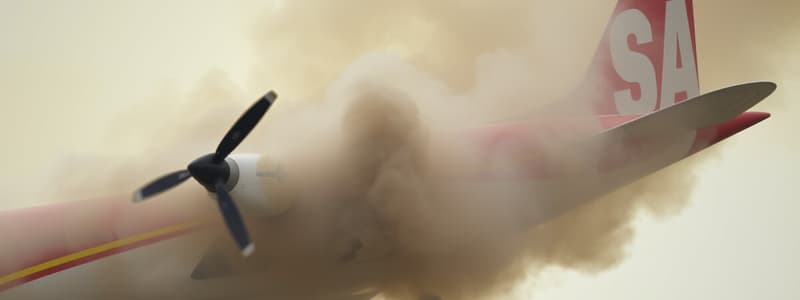Podcast
Questions and Answers
What is the recommended perimeter distance to enforce around a building to protect against falling glass?
What is the recommended perimeter distance to enforce around a building to protect against falling glass?
- 100 foot
- 400 foot
- 300 foot
- 200 foot (correct)
In a high-rise situation, where is the reserve force primarily moved during an emergency?
In a high-rise situation, where is the reserve force primarily moved during an emergency?
- Through the basement
- Through the rooftop access
- Through the exterior stairwell
- Through the lobby (correct)
How many floors below the fire should the interior staging area typically be located in a high-rise situation?
How many floors below the fire should the interior staging area typically be located in a high-rise situation?
- Four or more floors below
- Two or more floors below (correct)
- Three or more floors below
- One or more floors below
What is the primary reason for enforcing a perimeter around a building in the event of falling glass?
What is the primary reason for enforcing a perimeter around a building in the event of falling glass?
What is the purpose of the reserve force in a high-rise emergency scenario?
What is the purpose of the reserve force in a high-rise emergency scenario?
What is the recommended practice when ascending in an elevator during a fire emergency?
What is the recommended practice when ascending in an elevator during a fire emergency?
Where is the interior staging area set up in relation to the fire floor?
Where is the interior staging area set up in relation to the fire floor?
What is the estimated average ceiling height for floors above the first floor in high-rise buildings?
What is the estimated average ceiling height for floors above the first floor in high-rise buildings?
How does elevation affect water pressure during firefighting in high-rise buildings?
How does elevation affect water pressure during firefighting in high-rise buildings?
What is the primary tactic for rescue operations in a high-rise building?
What is the primary tactic for rescue operations in a high-rise building?
What is the primary action recommended for the first in engine crew under normal circumstances?
What is the primary action recommended for the first in engine crew under normal circumstances?
What can lead to ineffective positive pressure venting?
What can lead to ineffective positive pressure venting?
Which marking system can be used to indicate rooms that have been searched?
Which marking system can be used to indicate rooms that have been searched?
In which situation is rescue highly improbable within a compartment?
In which situation is rescue highly improbable within a compartment?
What is the first priority in a systematic search during a fire emergency?
What is the first priority in a systematic search during a fire emergency?
What is the primary means of fire extension from building to building?
What is the primary means of fire extension from building to building?
Which step is NOT part of the successful conflagration strategy?
Which step is NOT part of the successful conflagration strategy?
What are the three aspects of property conservation?
What are the three aspects of property conservation?
Which type of water flow can a sprinkler head provide?
Which type of water flow can a sprinkler head provide?
Where is water damage control primarily conducted?
Where is water damage control primarily conducted?
What is the appropriate positioning for the first engine company when laying attack lines?
What is the appropriate positioning for the first engine company when laying attack lines?
In terms of risk, how does the chance of a firefighter being killed in a manufacturing occupancy compare to that in a residential setting?
In terms of risk, how does the chance of a firefighter being killed in a manufacturing occupancy compare to that in a residential setting?
Which factor is NOT considered when assessing the time from ignition to flashover?
Which factor is NOT considered when assessing the time from ignition to flashover?
What does the '2 rule' indicate regarding structural collapse?
What does the '2 rule' indicate regarding structural collapse?
What is the only safe collapse zone requirement around a building?
What is the only safe collapse zone requirement around a building?
What is indicated by the occurrence of a mass casualty incident?
What is indicated by the occurrence of a mass casualty incident?
What differentiates a dry pipe sprinkler system from a wet pipe system?
What differentiates a dry pipe sprinkler system from a wet pipe system?
What is the threshold capacity of piping that triggers the requirement for an accelerator or exhauster by NFPA?
What is the threshold capacity of piping that triggers the requirement for an accelerator or exhauster by NFPA?
What should be done if pumps cannot be seen or heard at the main control valve?
What should be done if pumps cannot be seen or heard at the main control valve?
Which of the following is NOT one of the major types of standpipe systems?
Which of the following is NOT one of the major types of standpipe systems?
What kind of pressure does the law of hydraulics dictate per foot of elevation?
What kind of pressure does the law of hydraulics dictate per foot of elevation?
What is a common operational error at properties with automatic sprinkler systems?
What is a common operational error at properties with automatic sprinkler systems?
Draft curtains in large area sprinkler protected buildings are designed to:
Draft curtains in large area sprinkler protected buildings are designed to:
What is the recommended collapse zone relative to the height of the building?
What is the recommended collapse zone relative to the height of the building?
What is the time objective for turnout times according to NFPA 1710?
What is the time objective for turnout times according to NFPA 1710?
What is the formula used to estimate average response times without computer models?
What is the formula used to estimate average response times without computer models?
What is the range of minutes set by NFPA 1410 for training goals to establish a water supply?
What is the range of minutes set by NFPA 1410 for training goals to establish a water supply?
What process must ordinary solid materials undergo to release vapor fuel in a fire?
What process must ordinary solid materials undergo to release vapor fuel in a fire?
What percentage of fire ground fatalities is attributed to firefighters becoming caught or trapped?
What percentage of fire ground fatalities is attributed to firefighters becoming caught or trapped?
How many ounces of water should members pre-hydrate with before calls?
How many ounces of water should members pre-hydrate with before calls?
What is the top life safety priority if a fire can be quickly extinguished?
What is the top life safety priority if a fire can be quickly extinguished?
Flashcards are hidden until you start studying
Study Notes
High Rise Fire Safety
- Establish a 200-foot perimeter around buildings with risks of falling glass.
- Reserve forces typically move through the lobby to an interior staging area two or more floors below the fire.
- Lobby control responsibilities include operating elevators; periodic checks (every 5 floors) for smoke are recommended during ascents.
- Interior staging allows firefighters to change SCBA cylinders and rest in a safe area two or more floors below the fire floor.
- Above the 8th floor, ground-based appliances are ineffective for fire stream penetration.
- Estimated ceiling heights: 20 feet for the first floor, 10 feet or more for subsequent floors.
- Loss of pressure: gravity causes a reduction of 0.434 psi per foot in height.
- Use smooth bore or low-pressure nozzles to compensate for decreased pressure.
Neutral Pressure Plane
- The Neutral Pressure Plane (NPP) is where air movement balances; influences are from heat, fire, and wind.
- Below the NPP, air enters the building; at the NPP, air is neutral; above, air exits.
Fire Fighting Tactics
- The primary rescue tactic is a well-placed offensive attack.
- Average time to walk up 10 floors is 3:07 minutes, with the last 8 floors taking 59 seconds each.
- Defensive operations should confine fires, using streams effectively (solid, fog, or straight).
- Successful conflagration strategies include establishing defensive lines and narrowing flame fronts to ensure personnel safety.
Mass Casualty Incident
- A mass casualty incident occurs when there are more victims than available resources for care and transportation.
Sprinkler Systems
- Wet vs. Dry Systems: Dry systems have air under pressure; both require accelerators if the piping carries more than 500 gallons.
- Operational errors often include shutting down systems too early; separating tasks can mitigate risks.
- Large buildings may use draft curtains and automatic roof vents to limit fire spread.
Standpipe Systems
- Types of standpipe systems include automatic dry/wet, semi-automatic dry, manual dry, and manual wet systems.
- Hydraulic principles dictate 0.434 psi back pressure for every foot of elevation.
- In extreme cases, the initial engine crew should only advance an attack line, controlling outlet openings for effective venting.
Search and Rescue Prioritization
- Prioritize rescue systematically from those closest to the fire to those on the top floors.
- Implement simple marking systems to indicate searched rooms for effective tracking.
Collapse Zones
- A general rule for collapse zones is to establish them 1.5 times the building height.
- Exclusion zones should be marked where total collapse is imminent, even within buildings.
Turnout and Response Times
- NFPA 1710 recommends a one-minute turnout time for firefighters.
- Response times can also be estimated through the ISO formula: 1.7 x distance + 0.65 = travel time.
Training and Hydration
- NFPA 1410 training goals include establishing a water supply within 3 to 6 minutes.
- Firefighters should pre-hydrate with 6 to 8 ounces of water every hour and additional liquids during meals.
Fire Behavior and Safety
- Solid materials release vapor fuel through pyrolysis during fires.
- Almost 50% of fire ground fatalities involve being caught or trapped, highlighting the need for effective RIC staffing.
- Top life safety priority: extinguishing fires where possible; rescue visible occupants only when fire is controlled.
Tactical Errors and Firefighter Safety
- Avoid prioritizing rescues based on visibility; occupants inside may need immediate attention before securing the fire itself.
- Flashover timing: known variables can significantly alter ignition to flashover time, typically around 10 minutes.
- Construction methods impact structural integrity; modern use of trusses 24 inches apart is stronger than old methods requiring 16 inches.
Studying That Suits You
Use AI to generate personalized quizzes and flashcards to suit your learning preferences.




